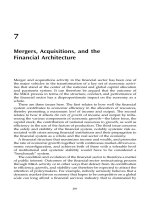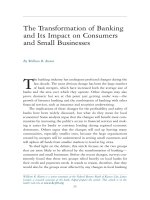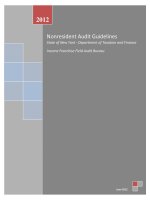Australian School of Business School of Banking and Finance FINS5516 INTERNATIONAL CORPORATE FINANCE COURSE OUTLINE SESSION 2, 2007 docx
Bạn đang xem bản rút gọn của tài liệu. Xem và tải ngay bản đầy đủ của tài liệu tại đây (135.67 KB, 10 trang )
FINS5516 – INTERNATIONAL CORPORATE FINANCE S2 2007 Page- 1
Australian School of Business
School of Banking and Finance
FINS5516
INTERNATIONAL
CORPORATE FINANCE
C
OURSE OUTLINE
S
ESSION 2, 2007
This is trial version
www.adultpdf.com
FINS5516 – INTERNATIONAL CORPORATE FINANCE S2 2007 Page- 2
1. COURSE STAFF 3
1.1 Communication with Staff 3
2.
INFORMATION ABOUT THE COURSE 3
2.1 Teaching times and Locations 3
2.2 Units of Credit 3
2.3 Parallel teaching in the course 3
2.4 Relationship of this course to other course offerings 3
2.5 Approach to learning and teaching 3
3.
COURSE AIMS AND OUTCOMES 4
3.1 Course Aims 4
3.2 Student Learning Outcomes 4
3.3 Teaching Strategies 4
4.
STUDENT RESPONSIBILITIES AND CONDUCT 5
4.1 Workload 5
4.2 Attendance 5
4.3 General Conduct and Behaviour 5
4.4 Keeping informed 5
5.
LEARNING ASSESSMENT 5
5.1 Formal requirements 5
5.2 Assessment Details 6
5.3 Special Consideration and Supplementary examinations 8
6.
ACADEMIC HONESTY AND PLAGIARISM 7
7.
STUDENT RESOURCES 8
7.1 Course Resources 8
7.2 Other Resources, Support and Information 9
8.
CONTINUAL COURSE IMPROVEMENT 9
9.
COURSE SCHEDULE 10
This is trial version
www.adultpdf.com
FINS5516 – INTERNATIONAL CORPORATE FINANCE S2 2007 Page- 3
1. COURSE STAFF
1.1. LECTURER
Dr Donghui Li
Office: Quad 3070
Email:
Tel: 9385 5873
Communication with Staff
Consultation Hours are:
Wednesday 9:00-11:00
Outside these times, meetings are by prior appointment only. E-mail the
staff in question and arrange a mutually convenient time. Teaching staff
will only respond to emails with reference to sender’s student name and
student number.
2. INFORMATION ABOUT THE COURSE
2.1 Teaching times and Locations
Wednesday 18:00 – 21:00 Chem Sc M07A (Week 1 only)
Chem Sci L1
(Week 2-14)
2.2 Units of Credit
This course carries 6 UOC
2.3 Parallel teaching in the course
There is no parallel teaching for this course
2.4 Relationship of this course to other course offerings
This is a core subject for all students who wish to graduate with finance
major in the MCom. The course is relevant to a broad range of professions
including corporate treasury management, corporate finance, international
securities trading and investment management.
2.5 Approach to learning and teaching
The experiential learning approach will be adopted throughout the course.
This involves a reflection of the knowledge and experience gained by
students in their previous academic and professional activities.
This is trial version
www.adultpdf.com
FINS5516 – INTERNATIONAL CORPORATE FINANCE S2 2007 Page- 4
3. COURSE AIMS AND OUTCOMES
3.1 Course Aims
This course provides students with the basic theoretical and practical
knowledge required for the management of financial functions of firms
operating in several countries. This includes necessary theory and evidence
basic to an understanding of international capital and foreign exchange
markets. In particular, this course covers topics such as international
diversification, foreign direct investment decisions, cost of capital for
multinational corporations, financial and political risks, the role of
multinational banks and the financial benefits of Euro-currencies and
Eurobonds, short-term financing, and international equity markets. The
general emphasis is on the identification and management of risk relating to
exchange rate fluctuations and government policy changes.
3.2 Student Learning Outcomes
By the end of the course, you should be able to:
1. Understand international capital and foreign exchange market
2. Identify and appraise investment opportunities in the international
environment
3. Identify risk relating to exchange rate fluctuations and government
policies and develop strategies to deal with them
4. Develop strategies to deal with other types of country risks associated
with foreign operations
5. Understand theoretical and practical issues involved in managing
international investment portfolio
3.3 Teaching Strategies
This course is a combination of formal lectures and a computing assignment.
The lectures are used to explain concepts and to give real life examples of
situations in which these concepts are used. The computing assignment is
designed for problem-solving and discussion of issues raised in the lectures.
There is an expectation that students will engage in additional readings, as
well as Butler.
This is trial version
www.adultpdf.com
FINS5516 – INTERNATIONAL CORPORATE FINANCE S2 2007 Page- 5
4. STUDENT RESPONSIBILITIES AND CONDUCT
4.1 Workload
It is expected that you will spend at least eight hours per week studying
this course. This time should be made up of reading, research, working on
exercises and problems, and attending classes. In periods where you need to
complete assignments or prepare for examinations, the workload may be
greater.
Over-commitment has been a cause of failure for many students. You
should take the required workload into account when planning how to
balance study with employment and other activities.
4.2 Attendance
Your regular and punctual attendance at lectures is expected in this course.
University regulations indicate that if students attend less than eighty per
cent of scheduled classes they may be refused final assessment.
4.3 General Conduct and Behaviour
You are expected to conduct yourself with consideration and respect for the
needs of your fellow students and teaching staff. Conduct which unduly
disrupts or interferes with a class, such as ringing or talking on mobile
phones, is not acceptable and students may be asked to leave the class.
More information on student conduct is available at: www.my.unsw.edu.au
4.4 Keeping informed
You should take note of all announcements made in lectures and/or on the
course web site. From time to time, the University will send important
announcements to your university e-mail address without providing you
with a paper copy. You will be deemed to have received this information.
5. LEARNING ASSESSMENT
5.1 Formal requirements
In order to pass this course, you must:
• Achieve a composite mark of at least 50%
This is trial version
www.adultpdf.com
FINS5516 – INTERNATIONAL CORPORATE FINANCE S2 2007 Page- 6
5.2 Assessment Details
Assessment Due Weight Learning Outcome/s
assessed
Group
Assignment
Week 11 20% TBA
In-class mid
session
exams
Weeks 5
and 10
Total 60% with
30% each
The two mid session exams
will test your
understanding of the
relevant lecture knowledge.
Week 5 mid-exam covers
lecture contents from week
1 to week 4, and Week 10
mid-exam covers lecture
contents from week 7 to
week 9.
In-class final
exam
Week 14
20%
The final exam will test
your understanding of
lecture contents from week
11 to week 13.
Announcement: All exams (two mid and one final) are in-class tests. The
format of all exams is multiple choice question ONLY.
5.3 Special Consideration and Supplementary examinations
UNSW policy and process for Special Consideration applies (see
/>).
Specifically:
• Applications for special consideration (including supplementary
examinations) must go through UNSW Central administration (within 3
working days of the assessment to which it refers) – applications will not
be accepted by teaching staff;
• Applying for special consideration does not automatically mean that you
will be granted additional assessment or that you will be awarded an
amended result;
• If you are making an application for special consideration (through
UNSW Central Administration) please notify your Lecturer in Charge;
This is trial version
www.adultpdf.com
FINS5516 – INTERNATIONAL CORPORATE FINANCE S2 2007 Page- 7
• Please note: a register of applications for Special Consideration is
maintained. History of previous applications for Special Consideration is
taken into account when considering each case.
6. ACADEMIC HONESTY AND PLAGIARISM
The University regards plagiarism as a form of academic misconduct, and
has very strict rules regarding plagiarism. For full information regarding
policies, penalties and information to help you avoid plagiarism see:
Plagiarism is the presentation of the thoughts or work of another as one’s own.* Examples
include:
• direct duplication of the thoughts or work of another, including by copying work, or
knowingly permitting it to be copied. This includes copying material, ideas or concepts
from a book, article, report or other written document (whether published or
unpublished), composition, artwork, design, drawing, circuitry, computer program or
software, web site, Internet, other electronic resource, or another person’s assignment
without appropriate acknowledgement;
• paraphrasing another person’s work with very minor changes keeping the meaning,
form and/or progression of ideas of the original;
• piecing together sections of the work of others into a new whole;
• presenting an assessment item as independent work when it has been produced in
whole or part in collusion with other people, for example, another student or a tutor;
and,
• claiming credit for a proportion a work contributed to a group assessment item that is
greater than that actually contributed.†
Submitting an assessment item that has already been submitted for academic credit
elsewhere may also be considered plagiarism.
The inclusion of the thoughts or work of another with attribution appropriate to the
academic discipline does
not
amount to plagiarism.
Students are reminded of their Rights and Responsibilities in respect of plagiarism, as set
out in the University Undergraduate and Postgraduate Handbooks, and are encouraged to
seek advice from academic staff whenever necessary to ensure they avoid plagiarism in all
its forms.
The Learning Centre website is the central University online resource for staff and student
information on plagiarism and academic honesty. It can be located at:
www.lc.unsw.edu.au/plagiarism
The Learning Centre also provides substantial educational written materials, workshops,
and tutorials to aid students, for example, in:
• correct referencing practices;
• paraphrasing, summarising, essay writing, and time management;
• appropriate use of, and attribution for, a range of materials including text, images,
formulae and concepts.
Individual assistance is available on request from The Learning Centre.
This is trial version
www.adultpdf.com
FINS5516 – INTERNATIONAL CORPORATE FINANCE S2 2007 Page- 8
Students are also reminded that careful time management is an important part of study
and one of the identified causes of plagiarism is poor time management. Students should
allow sufficient time for research, drafting, and the proper referencing of sources in
preparing all assessment items.
* Based on that proposed to the University of Newcastle by the St James Ethics Centre. Used with kind
permission from the University of Newcastle
† Adapted with kind permission from the University of Melbourne.
7. STUDENT RESOURCES
7.1 Course Resources
Required textbook:
Butler, K. (2004). Multinational Finance, South Western College Publishing.
Third Edition. This book is available from the UNSW bookshop located near
the Quadrangle.
Recommended textbooks:
Shapiro, A.C. (2002). Multinational Financial Management, 7
th
Edition,
Wiley.
Sathye, M, Rose L, Allen, L and Weston R (2006). International Financial
Management, John Wiley & Sons, Australia Ltd.
Eiteman, D.K., A.I. Stonehill and M.H. Moffett (2001) Multinational
Business Finance, 9
th
Edition, Addison-Wesley.
Moosa, I. A. (2004). International Finance: An Analytical Approach,
Second Edition, McGraw-Hill, Australia
Other Useful Reference Texts:
Buckley, A. (1992). Multinational Finance, Prentice-Hall Australia.
Eaker, M., F.J. Fabozzi, and D. Grant (1996). ‘International Corporate
Finance’, Dryden Press.
Eun, C.S. and Resnick B.G. (2001). ‘International Financial Management,
3
rd
Edition, McGraw-Hill.
Reilly, F.K., and K.C. Brown (1997) ‘Investment Analysis and Portfolio
Management’, 5th Ed., Dryden Press.
Solnik, B. and Mcleavy D. (2004). International Investment, Fifth Edition,
Addison Wesley.
WebCT Vista
Lecture notes, assessment details, and announcements are all provided on
WebCT Vista. Students should make a point of checking this site
regularly.
This is trial version
www.adultpdf.com
FINS5516 – INTERNATIONAL CORPORATE FINANCE S2 2007 Page- 9
7.2 Other Resources, Support and Information
The University and the Faculty provide a wide range of support services for
students, including:
• Learning and study support
o FCE Education Development Unit
( )
o UNSW Learning Centre ( )
o EdTec – WebCT information ( )
• Counselling support -
• Library training and support services-
• Disability Support Services – Those students who have a disability
that requires some adjustment in their teaching or learning
environment are encouraged to discuss their study needs with the
Course Coordinator or the Equity Officer -
( Early notification is essential
to enable any necessary adjustments to be made.
In addition, it is important that all students are familiar with University
policies and procedures in relation to such issues as:
• Examination procedures and advice concerning illness or
misadventure
/>xaminationrules.html
• Occupational Health and Safety policies and student responsibilities;
/>W%20OHS%20Accountability.pdf
8. CONTINUAL COURSE IMPROVEMENT
Each year feedback is sought from students and other stakeholders about
the courses offered in the School and continual improvements are made
based on this feedback. UNSW's Course and Teaching Evaluation and
Improvement (CATEI) Process ( />1_catei_process.cfm) is one of the ways in which student evaluative feedback
is gathered. Significant changes to courses and programs within the School
are communicated to subsequent cohorts of students.
This is trial version
www.adultpdf.com
FINS5516 – INTERNATIONAL CORPORATE FINANCE S2 2007 Page- 10
I will hand out questionnaire and feedback to questionnaire frequently to
communication with you during the course of this subject. This is to
facilitate your study.
9. Course Schedule
Lecture Topics and Required Reading
Wk Subject Butler
Ch.
1 Introduction/course information 1
2 World Trade and the International Monetary
System
2
International Financial Markets 3
3 Foreign Exchange, Eurocurrencies, and
Currency Risk Management
4
The International Parity Conditions 5
4 Currency Futures and Futures Market 6
Currency Options and Options Market 7
5 In-class Mid-exam I (covering week 1 to week 4
lecture contents)
6 Computer assignment (Topic: TBA)
7 Currency Swaps and Swaps Market 8
The Rationale for Hedging Currency Risks 9
8 Multinational Treasury Management 10
Managing Transaction Exposure to Currency
Risk
11
9 Managing Operating Exposure to Currency Risk 12
Managing Translation Exposure to Currency
Risk
13
Country Risk Management 14
Cross-Border Capital Budgeting 15
10 In-class Mid-exam I (covering week 7 to week 9
lecture contents)
11 Multinational Capital Structure and Cost of
Capital
16
Taxes and Multinational Corporate Strategy 17
12 Real Options and Cross-Border Investment 18
Corporate Governance and the International
Market for Corporate Control
19
13 International Portfolio Diversification 20
International Asset Pricing 21
Managing an International Investment Portfolio 22
14 In-class final exam (covering week 11 to week 13
lecture contents)
-
This is trial version
www.adultpdf.com









